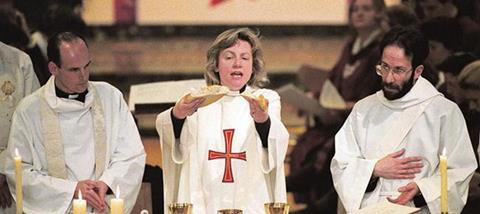
It’s 1992. Geri Halliwell is yet to put on her Union Jack dress and Christian women are still to don the dog collar as priests.
That year, the Church of England’s assembly, General Synod, voted that women could lead churches, changing the make-up of the Anglican church, and the career of Dawn French, forever.
Before that, many women were ordained as deacons and had a role in services, but they could not preside over Holy Communion, be the head of a parish or lead liturgy.
On 12th March 1994, 32 women were priested at Bristol Cathedral for the first time. Many saw this as a great success and a time when the church was stepping in line with other sectors, but for others it was a sad day, where the church favoured the world over the Word.
In most media outlets today the anniversary has been discussed in much the same way as the benefits of having women on company boards or the need to break the glass ceiling in engineering, politics and science, but inside the Church it's a very different story. As I've spoken to Christians, it's become clear that within the conversation being had by women from all sides of the debate, it's understood that God’s global church does and perhaps should follow a different model to that of a bank or political party.
To reflect on 25 years of female ordination I’ve spoken to four women from across the church spectrum about what they think about ordination, the tensions they hold and the future they pray for.
The first female priest
Reverend Prebandary Angela Berners-Wilson (pictured above), was the first of 32 female priests to be priested in 1994 – a moment she had been waiting for since she left college in 1979.
Speaking of the day in General Synod she remembers: “We didn’t know which way the vote was going to go. It was quite finely balanced and I and lots of friends were at Church House all day in the visitors’ gallery to listen to what was happening and then the vote got through…and the Archbishop, George Carey said with a very bland face – ‘ayes’ and ‘noes’, giving the numbers, and we all knew we had to have a two-thirds majority in all three houses.
"I was standing next to a friend who was a priest and he’d also been a mathematician in his previous existence and he’d worked out exactly what the numbers were and he said ‘no, we’ve lost it’, but he hadn’t thought about abstentions! I was desperately trying to do mental arithmetic and counting on my fingers and I thought we had, and then we had, and this great sort of ‘Whoop!’ went up – I shall never forget that, it was very exciting.”
Dissenting voices
The legislation to allow women priests went through while the Rt Rev Libby Lane - who was to later become the first female Bishop - was at theological college with her husband, George Lane. They were ordained together in 1994. Bishop Libby tells me: "I was in that first cohort of women who were selected and trained and ordained exactly in parallel alongside their male peers, so we knew that that was going to be our trajectory, that when we completed our training, which we had done at the same time, we would be deaconed and then priested at the same time".
Both Bishop Libby and Rev Preb. Angela tell me that despite their jubilation, they knew people who found their ministry challenging and wouldn’t come to services they were leading.
It might be tempting to assume those who disagreed with the decision were men who were feeling a loss of power. But the truth is, there are many Christian women who would still not lead a congregation or preach to men because of their theological convictions.
Amy Wicks is a theology student at Oakhill College. She worked for a conservative evangelical church for 14 years, mostly as a full-time women’s worker teaching the Bible, before deciding to get more training. When I ask if she'd ever considered getting ordained, she replies: “I thought about it before going to college and I suppose where I'm coming from is I take a view that the Bible describes men and women's roles in church as being different and there's variety there. I want to try and express that in the way that I serve in church."
So where would she draw the line in the responsibilities she’d be happy to do? “This whole topic gets quite tricky if we just define men and women's roles in terms of what they can and can't do…actually, it's a much bigger theological question about how God created men and women to work together for his mission…there's teamwork, but there's distinction.”
There may be a need on this day for a pinch of Romans 14, where we’re instructed to not judge those who hold different theological views but allow people live to within their convictions
This distinction is also referenced by Rachel Browning, associate minister at Christ Church Cambridge. She's on the leadership team of her church and ordained as a deacon, but chose not to be ordained as a priest: “When I went to theological college I really wanted to start from scratch…I studied Greek and Hebrew too and I wanted to go back to those texts. I guess everybody thinks of 1 Timothy 2, 1 Corinthians 14 and the pastoral epistles generally and I still remained of that persuasion that I should not have that authority of leading a church or teaching men in an authoritative way, week-by-week in the regular gathered church. But, in saying that, I think there are many, many things that I do get to do and that I enjoy doing! And I think there’s a great role within churches being a woman on the leadership team.”
Looking ahead
Bishop Libby says that despite other people's doubts, her calling is something that has been tested through the doing of it, as well as the discernment of Christians around her. When asked when there might be a female Archbishop of Canterbury, Bishop Libby says: "I think the issue around Archbishop will come when it comes. There are certainly women who have their gifts and who will have the experience when those vacancies arise and I pray that they will be discerned alongside their brothers who exercise episcopal ministry and that time will come. I don't know when that will be. But if it does, and it's in my lifetime, I will rejoice."
But how do those who disagree with what happened 25 years ago think about the future? According to Amy Wicks we need to "expand the way that we train everyone in the church to be doing the work of discipling each other and teaching the Bible".
"That's what I'd love to see - more women in all walks of life and all areas of the church growing in confidence in the scriptures and growing in confidence to teach it to each other.”
There may be a need on this day for a pinch of Romans 14, where we’re instructed to not judge those who hold different theological views but allow people live to within their convictions. Even so, when it comes to Amy's suggestion that all Christian women should be growing in confidence within their faith, perhaps that's something we really can all agree on.
Listen to a special report on the 25th anniversary by Cara Bentley:



























